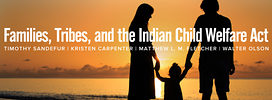ICWA was passed with good intentions: to combat abuses, particularly at the state level, and to protect the legitimate authority of tribal governments to decide child welfare cases on reservations. It also contains worthwhile protections, such as provisions that ensure people understand the legal documents they’re asked to sign and that require federal funding for tribal family services. But it also contains many unconstitutional and unjust provisions, including the race-based standards that, as I’ve shown, literally implement racial segregation for Native American children.
The Act—and its state-law adjuncts—need to be fixed in order to better protect Indian children. The “active efforts” requirement that forces child safety workers to return kids to the families that have abused them should also be modified. That requirement applies only to Native children; for all other kids, only “reasonable efforts” are required, and those aren’t required in cases of severe wrongdoing. The same should hold for Indian kids. The race-based preferences that mandate that foster and adoption placement be with “Indian families”—without regard for tribe!—should be ended, and children placed with families that will care for their specific needs. The different evidentiary standards that apply to cases involving Native kids as opposed to other kids should be ended—the rules should be the same for everyone, regardless of race. BIA guidelines and regulations that implement separate, race-based rules, should also be abandoned. The provisions that give tribal courts jurisdiction off reservation over children with no political or cultural affiliation with a tribe, but whose only connection to the tribe is their DNA—those provisions must be abolished, too.
The Federal Interethnic Placement Act prohibits discrimination on the basis of race in an adoption proceeding. Yet it contains a provision that explicitly exempts Indian children. That should be abolished—it should not be legal to discriminate against them in child custody proceedings. And states should be barred from implementing race-based rules, too. California, for example, following the BIA’s lead, now applies ICWA on the mere suspicion that a child is of Indian heritage, unless proven otherwise. That’s wrong.
Most importantly of all, federal and state laws should be amended to ensure that the best interests of the child shall be the highest priority in all cases, regardless of race. That means the best interests of the individual child in his or her specific case. It’s wrong for Congress to simply presume that because a child has Native DNA, his or her fate should be decided by tribal authorities.
The public and the media also need to be educated about ICWA’s many flaws, and how the Act makes it harder for child welfare agencies to protect Indian kids. Sadly, this will be a difficult battle.
Consider this recent story in the Minneapolis Star-Tribune, about an alcoholic couple whose kids have had to be repeatedly rescued from their neglect. The children, all under 10, “have cycled in and out of foster homes so often that social workers wrote ‘more than 500 days’ on court papers that indicated the length of time in foster care,” says the story. In fact, the kids have been removed from the couple at least three times thanks to their repeated bouts of drinking and neglecting their children: “The officer could smell the apartment from several doors away…. ‘Both parents were clearly intoxicated…. The entire apartment smelled like urine. Ms. Goodsky admitted that the family had been sleeping on the very dirty, food laden living room floor…the children reported that they have been missing school because they don’t have clean clothing….’”
Behavior like this would have cost most parents custody of their children—for the benefit of the children. But because these children are “Indian children” under ICWA, they have been returned time and time again to a couple who have repeatedly demonstrated their inability to care for these kids.
What’s amazing about this article is how it’s spun as a win. This time around, the article says, the parents have promised to sober up. Speaking as someone whose family has suffered greatly from alcoholism, I certainly hope they do. But the risk these children face is immense—and they face it because the system prioritizes other things over their best interests…because they’re Indian children. Maybe this family will succeed where others have failed, but what’s been done to these children in the meantime?
Children need permanent, stable, loving homes—and they need their individual best interests to be prioritized over other considerations. And that means that we stop regarding Indian children as categorically different. Whether it’s done in a demeaning way, or in a romanticizing way, that habit of thinking hurts real kids.
These are not somebody else’s children—and not somebody else’s responsibility. These are American children, citizens of the United States, in American homes, whose rights are guaranteed by the American legal system. I’m sorry to say that in discussing ICWA I’ve sometimes been challenged, on racial grounds, for raising these concerns. “Why do white people care anyway?” reads one tweet that I received. The answer to that was given years ago by Martin Luther King Jr: “I am cognizant of the interrelatedness of all communities and states,” he wrote. “We are caught in an inescapable network of mutuality, tied in a single garment of destiny. Whatever affects one directly, affects all indirectly. Never again can we afford to live with the narrow, provincial ‘outside agitator’ idea. Anyone who lives inside the United States can never be considered an outsider anywhere within its bounds.”
For too long, these children have been treated as different, subject to a separate set of disadvantageous rules, because of their biology—even if they have never visited tribal lands and have no cultural connection to a tribe. That’s wrong. All are entitled to equal justice before the law.

